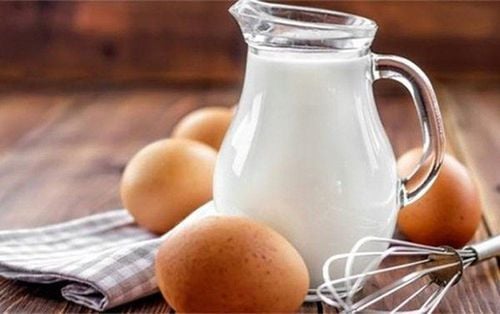This is an automatically translated article.
Although they are prepared in different ways, eggs are still quite popular. However, besides the possible health benefits of eggs, you may question whether it is safe to eat eggs while pregnant. The article will provide specific information about this type of food.
1. Is it safe to eat eggs during pregnancy?
When you are pregnant, you will expect your doctor to give you advice on a list of foods to avoid during this period. That list may include unpasteurized foods, as well as some raw or undercooked foods...
However, both pasteurized and cooked methods can help eliminate thoroughly eliminate potentially harmful bacteria in food, such as listeria . Normally, our bodies are pretty well able to handle these bacteria without any ill effects. But pregnant women have weaker immune systems, which means you or your unborn baby can be harmed by eating unpasteurized or undercooked food.
So the short answer is that it is safe to eat eggs during pregnancy, as long as they are pasteurized and fully cooked.
Raw or undercooked eggs can carry disease-causing organisms such as Salmonella , which causes food poisoning. If you become sick with Salmonella bacteria, you may experience high fever, vomiting, diarrhea, and dehydration. In severe cases, these symptoms can be so severe that they cause preterm labor or even miscarriage. Pasteurization and cooking kill the Salmonella bacteria.
To kill bacteria, eggs need to be cooked until the yolks and whites harden. That means no soft-boiled, hard-boiled or watery eggs.
However, cooked eggs (whether they're pasteurized or not) can be risky if you don't eat them right away, even if they're refrigerated. Any food that is not handled or refrigerated properly, including eggs, can contain the bacteria that causes the disease - listeriosis, which is one of the possible causes of miscarriage, stillbirth or premature birth. .
To prevent listeriosis, practice safe food handling and storage, and eat leftovers as soon as possible. Cook any egg-based dishes (such as quiches or soups) to 71 degrees Celsius and reheat any previously cooked dishes to that temperature just before you eat them.

Trứng gà rất giàu protein - cần thiết cho sự phát triển của thai nhi
2. How to prepare eggs properly during pregnancy
You probably know that eggs carry a risk of foodborne illnesses like salmonella, which can be dangerous to you and your unborn baby. And you've probably been told not to eat mayonnaise because it contains eggs. However, if properly processed, eating eggs in general and eating eggs during pregnancy brings many benefits to mother and baby.
Eggs, a very versatile food. As for the preparation, some cooking methods involve completely cooking the eggs, such as: can be made to eat mugwort eggs during pregnancy. However, other methods only partially cook the eggs, in which case part of the egg remains whole. If you want, you need to avoid eating raw eggs, then you should avoid processing eggs with watery yolks: omelets, scrambled eggs, poached eggs, hard-boiled eggs... You should also avoid foods contain uncooked eggs such as: egg salad dressings; cream; mayonaise
If you get food poisoning from undercooked eggs, it can be passed to your baby during pregnancy and lead to an infection of the amniotic fluid. It is best to be cautious to avoid a bad situation affecting your health.
3. How to choose and cook eggs during pregnancy
You can ensure food safety for you and your baby by thoroughly cooking eggs before eating. Signs of a well-cooked egg include firm yolks and whites, with no grooves in the middle.
Also, double-check a hard-boiled egg before eating it. Cut in half to make sure the middle is cooked. To fully boil an egg will take about 10-12 minutes.
If you are frying eggs, cook them for about 2 to 3 minutes on both sides before serving. Or when buying eggs from the supermarket, only buy eggs that are labeled “pasteurized”.
4. Benefits of eggs during pregnancy
Knowing how to properly cook eggs is important because eggs provide many health benefits during pregnancy.
Eggs have a nutritional composition mainly consisting of: fat and protein and contain very little carbohydrates. Eating foods rich in protein and healthy fats can help you maintain healthy blood sugar levels, which may reduce your risk of gestational diabetes.
Certain types of eggs also provide quite a rich source of vitamin D. Many studies have shown that free-range, pasture-raised and organically raised eggs contain more vitamin D than conventional eggs. The content of vitamin D in eggs is concentrated in the yolk. So eating whole eggs instead of just egg whites will provide the body with more essential nutrients.

Ăn trứng đúng cách sẽ mang lại nhiều lợi ích cho sức khỏe của cả mẹ và bé
Importance of vitamin D
Although vitamin D is found in small amounts in some foods, it is important for pregnant or nursing women to check their current vitamin D levels and take a supplement. Vitamin D3 supplements for appropriate during pregnancy.
Pregnant and breastfeeding women have a higher recommended need for vitamin D than non-pregnant women. The nutrients in eggs are essential for many aspects of health, including:
Maintain strong bones Support immune function Promote fetal development Not only that, eggs are among foods that contain a lot of nutrients. Essential nutrients for a healthy pregnancy include B12, choline and protein. Eggs are filling and contribute to a well-balanced diet that helps in weight management during pregnancy.
Eggs are also a good source of iron. During pregnancy, your body needs more iron than usual, which helps maintain your energy levels.
Pregnant women have higher recommended protein requirements than normal women. In fact, some studies estimate protein requirements for pregnant women to be 1.2 grams/kg body weight per day during early pregnancy and 1.52 grams/kg body weight per day during pregnancy. late pregnancy. Because protein needs depend on many factors, including body size and activity level, when you're pregnant you should talk to your doctor about increasing your protein intake. your diet.
Eggs provide a rich source of protein. A large 50-gram egg contains 6 grams of easily absorbed protein.
5. Benefits of eggs for the developing fetus
Eggs also belong to the group of foods that contain nutrients that help in the growth and development of the baby. They are rich in nutrients like vitamin B12 and choline, both of which contribute to healthy brain development.
Eggs are also a great source of protein. When you consume protein, your body breaks down higher-order proteins into amino acids, the building blocks of protein, and the foundation of life.
Protein is found in skin, hair, muscles and bones, and also damages cells that need protein to function properly. This is another essential nutrient for your baby's growth and development.
When you are pregnant, eating a balanced diet is very important for the health of you and your unborn baby. You can boil, fry or sauté them - it's important to make sure they're thoroughly cooked. Practicing safe egg handling can reduce the risk of foodborne illness during pregnancy.
Please dial HOTLINE for more information or register for an appointment HERE. Download MyVinmec app to make appointments faster and to manage your bookings easily.
Reference sources: babycenter.com, healthline.com, webmd.com












